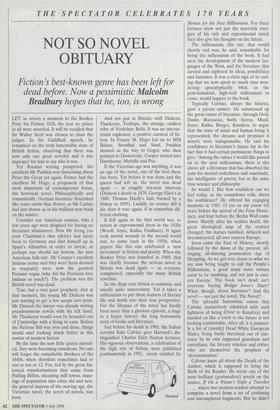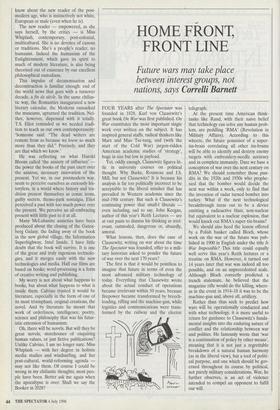THE SPECTATOR CELEBRATES 170 YEARS
NOT SO NOVEL OBITUARY
Fiction's best-known genre has been left for
dead before. Now a pessimistic Malcolm Bradbury hopes that he, too, is wrong LET us return a moment to the Booker Prize for Fiction 1828, the year no prizes at all were awarded. It will be recalled that Sir Walter Scott was chosen to chair the judges. In his Guildhall speech, he remarked on the truly lamentable state of British fiction, observing that there was now only one great novelist and it was improper for him to say who it was.
Yet Russian writing prospered: the excellent Mr Pushkin was fantasising about Peter the Great yet again. France had the excellent M. Hugo, a proponent of that most important of contemporary forms, the historical novel. Philosophically and romantically, German literature flourished like some exotic blue flower, as Mr Carlyle had just shown us in his brilliant new book on the matter.
Consider our American cousins, who a few years ago were despised for having no literature whatsoever. Now Mr Irving (on your Chairman's own advice) had lately been to Germany and shut himself up in Spain's Alhambra in order to invent, or perhaps one should say borrow, the new American folk-tale. Mr Cooper's excellent Indians (some said they were Scots dressed in warpaint) were now the greatest Parisian vogue (why did the Parisians love Indians so much?). The problem was the British novel was dead.
True: but a very poor prophecy. Just at that moment, the young Mr Dickens was just starting to get a few scraps into print. Mr Disraeli the lawyer was already writing pseudonymous novels with his left hand. Mr Thackeray would soon be hounded out of Cambridge with a living to earn. Before the Reform Bill was over and done, things would start looking much better in this matter of modern fiction.
By the time the new little queen ascend- ed, they were becoming tumultous. No one will forget the remarkable Bookers of the 1840s, when shortlists sometimes had to run to ten or 12. For, fed by the great his- torical transformations that came from Puffing Billies, steaming mill towns, mass- ings of population into cities old and new, the general impress of the moving age, the Victorian novel, the novel of novels, was born. And not just in Britain, with Dickens, Thackeray, Trollope, the strange, endless tribe of Yorkshire Bells. It was an interna- tional explosion, a positive carnival of fic- tion. In France M. Hugo led on to MM Balzac, Stendhal and Sand. Pushkin showed us the way to Gogol, who then pointed to Dostoevsky. Cooper turned into Hawthorne, Melville and Poe.
If the Victorian age was anything, it was an age of the novel, one of the best there has been. Yet before it was done and the queen had left us, the novel was dead again — at roughly ten-year intervals (Dickens's death in 1870, George Eliot's in 1880, Thomas Hardy's Jude burned by a bishop in 1895). Luckily, no sooner did it die than it rose again, if in somewhat dif- ferent clothing.
It fell again in the first world war, to return in experimental dress in the 1920s (Woolf, Joyce, Kafka, Faulkner). It again took mortal wounds in the second world war, to come back in the 1950s, when papers like this one celebrated a 'new movement' in fiction and poetry. When the Booker Prize was founded in 1969, that was chiefly because the serious novel in Britain was dead again — as everyone complained, especially the many British novelists.
So the dirge over fiction is common, and usually quite unnecessary. Yet it takes a millennium to put these matters of literary life and death into their true perspective. For the lifespan of the novel has hardly been more than a glorious episode, a stage in a larger history: the long humanistic story of books and literature.
Just before his death in 1985, the Italian novelist Italo Calvino gave Harvard's dis- tinguished Charles Eliot Norton lectures. His vigorous observations, a celebration of the high arts of fiction, were published posthumously in 1992, nicely entitled Six Memos for the Next Millennium. For these lectures show not just the maverick ener- gies of his rich and experimental mind; they also give his thoughts on the future.
The millennium, this one, that would shortly end was, he said, remarkable for being the millennium of the book. It had seen the development of the modern lan- guages of the West, and the literature that carried and explored its ideas, possibilities and fantasies. It was a clear sign of its end- ing that we now spent so much time won- dering apocalyptically what, in the post-industrial, high-tech millennium to come, would happen to the book.
Typically Calvino, always the futurist, gave a joyous answer. He summoned up the great canon of literature, through Ovid, Dante, Boccaccio, Swift, Sterne, Musil, Joyce, Kafka, Borges, Kundera, to argue that the state of mind and human being it represented, the dreams and promises it stored, were indispensable. He said his confidence in literature's future lay in the fact that it had certain permanent things to give: 'Among the values I would like passed on to the next millennium, there is this above all: a literature that has absorbed the taste for mental orderliness and exactitude, the intelligence of poetry, but at the same time science and philosophy.'
So would I. But how confident can we feel today, as the countdown rolls, about his confidence? He offered his engaging memoirs in 1985: 15 (or on my count 16) years before the arrival of the Four Horse- men, and four before the Berlin Wall came down. Shortly after his sudden death, the great ideological map of the century changed; the statues tumbled, defaced and deconstructed, all over eastern Europe.
Soon came the End of History, shortly followed by the dawn of the present, all- singing, all-dancing postmodern Age of Shopping. As we get ever closer to what we are now being taught to call the People's Millennium, a good many more statues seem to be tumbling, and not just in east- ern Europe. The book isn't dead; isn't everyone buying Bridget Jones's Diary? What, though, about literature? And the novel — not just the novel, The Novel?
The splendid humanistic canon that Calvino instinctively inhabited with such lightness of being (Ovid to Kundera) and handed on like a torch to the future is not looking comfortable. After all, it is primari- ly a list of (mostly) Dead White European Males, being busily theorised out of exis- tence by its own supposed guardians and custodians, the literary scholars and critics, who are themselves the prophets of `decanonisation'.
Calvino knew all about the Death of the Author, which is supposed to bring the Birth of the Reader. He wrote one of the most brilliant (postmodern) novels on the matter, If On a Winter's Night a Traveller . . . , where two modern readers attempt to compose a novel from a set of confusing and uncompleted fragments. But he didn't know about the new reader of the post- modern age, who is instinctively not white, European or male (even when he is).
The new reader — empowered, as she says herself, by the critics — is Miss Whiplash, contemporary, post-colonial, multicultural. She is no devotee of canons or traditions. She's a people's reader, no humanist. Indeed the humanism of the Enlightenment, which gave its spirit to much of modern literature, is also being theorised out of existence by our excellent philosophical custodians.
This impulse of decanonisation and deconstruction is familiar enough: end of the world news that goes with a turnover decade, a fin de siecle. In the same chilias- tic way, the Romantics inaugurated a new literary calendar, the Moderns ransacked the museums, upturned the tradition. Nei- ther, however, dispensed with it totally. T.S. Eliot reminded us we needed tradi- tion to teach us our own contemporaneity: `Someone said: "The dead writers are remote from us because we know so much more than they did." Precisely, and they are that which we know.'
He was reflecting on what Harold Bloom called 'the anxiety of influence' the power the books of the past exert over the anxious, necessary innovation of the present. Yet we, in our postmodern way, seem to perceive ourselves as curiously his- toryless, in a world where history and tra- dition present themselves as comic icons, guilty secrets, theme-park nostalgia. Eliot perceived a past with too much power over the present. We perceive an all-embracing present with little past to it at all.
Many McLuhanite anxieties have been produced about the closing of the Guten- berg Galaxy, the fading away of the book in the new global village, the Information Superhighway, Intel Inside. I have little doubt that the book will survive. It is one of the great and truly ingenious technolo- gies, and it merges easily with the new technologies and media. Half our films are based on books; word-processing is a form of creative writing and publishing.
My worry is not about what happens to books, but about what happens to what is inside them. Calvino trusted it would be literature, especially in the form of one of its most triumphant, original creations, the novel. And by literature he meant that work of orderliness, intelligence, poetry, science and philosophy that was his futur- istic extension of humanism.
Oh, there will be novels. But will they be great novels, storehouses of enquiring human values, or just fictive publications? Unlike Calvino, I am no longer sure. Miss Whiplash — with her degree in holistic media studies and windsurfing, and her post-cultural, world-reforming agenda may not like them. Of course I could be wrong in my chiliastic thoughts; most peo- ple have been. Better ask me again when the apocalypse is over. Shall we say the Booker in 2028?















































































































 Previous page
Previous page